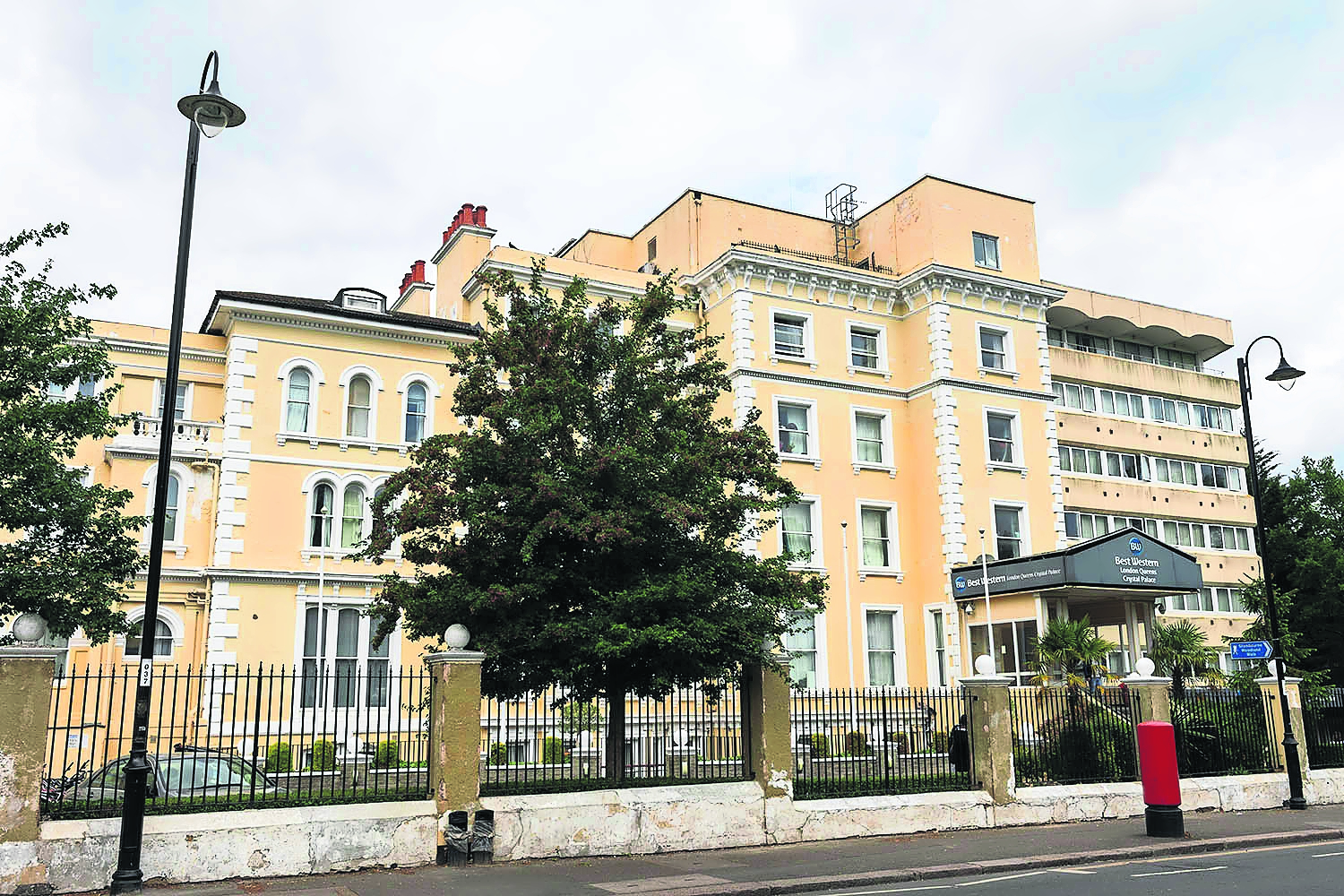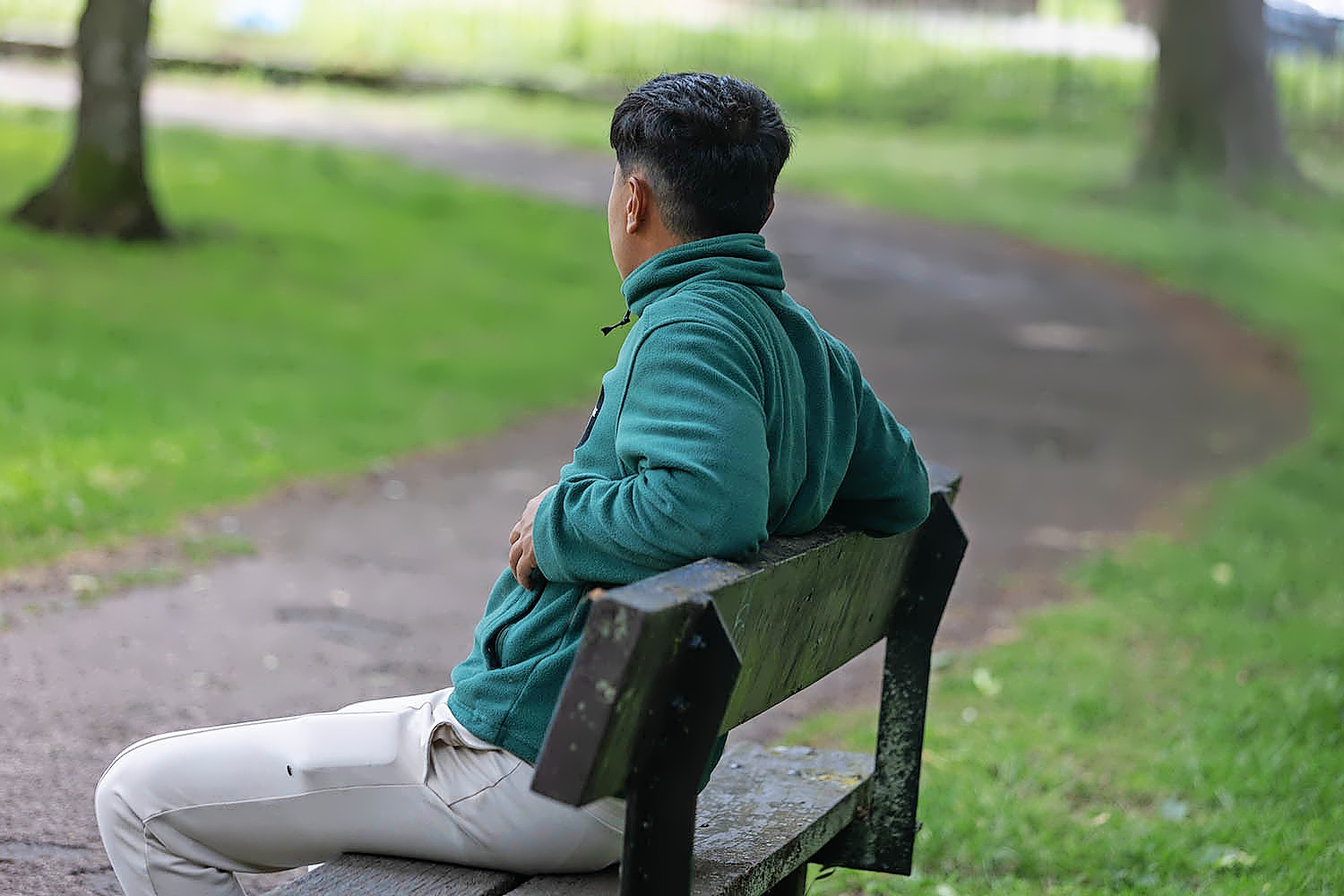Everyone at the Queens hotel knows the date they checked in. Very few know when they will leave.
Each of the grand Victorian hotel’s 331 rooms tells a complicated story of Britain’s asylum system, its failed policies, broken promises and wild overspending.
The hotel in Crystal Palace, south London, has been home to many stories since it opened in 1854. A blue plaque outside states that Émile Zola lived there in 1898, while in exile over the Dreyfus affair. Kaiser Wilhelm stayed while visiting Queen Victoria, and Lawrence Durrell lived there for two years with his family – including brother Gerald – before they moved to the Greek island of Corfu.

Best Western London Queens Crystal Palace
Nowhere in Britain today are policy changes felt more keenly than in this hotel and more than 200 others like it, still housing tens of thousands of asylum seekers across the country.
Many of the world’s struggles reach the sky blue doors of its rooms, its two-toned bedroom walls and neatly tiled bathrooms. Asylum seekers here have fled Afghanistan, Iran, Ethiopia, Eritrea, Albania, Pakistan, India, China, Colombia, Syria and beyond.
The last government ramped up the use of hotels like this one during the pandemic, using poorly designed contracts. Housing asylum seekers is expected to cost the taxpayer more than £15bn over 10 years. That is more than three times the original projected cost, with much of the money being drawn from the aid budget.
Rooms cost up to £148 per person per night, compared with about £14 in community housing.
The system suits only the companies making hundreds of millions from running the hotels – Graham King, the head of Clearsprings, the firm overseeing Queens, this year became a billionaire.
Under political pressure to deliver, Labour has taken firm action since July. Now it is learning that fixing one problem creates another.
The Home Office’s focus on pace in clearing the inherited asylum claims backlog has prompted a fast-growing backlog in appeals as well as rising homelessness. But as the debate rages over cost, efficiency and border security in Britain’s broken asylum system, the greatest toll is always human.
Newsletters
Choose the newsletters you want to receive
View more
For information about how The Observer protects your data, read our Privacy Policy
The atmosphere at Queens has been “totally different” since Labour sped up the processing of claims, according to one community volunteer, with people less settled and having less time to acclimatise and learn English before being moved on. Those at the hotel for extended periods are in the long waiting line for an appeal date, having been rejected initially. Almost all rejections lead to an appeal.
Murtaza arrived at the hotel on 3 May 2024. “I was rejected in October. Overall it's eight months that I'm waiting [for an appeal date],” Murtaza, who asked to use a pseudonym, said. There is no system for checking what stage his case has reached, so he must wait.
“[But] I'm the kind of person, I cannot say, give me this, give me this. So I'm satisfied.
“For me, the problem is bigger. I'm thinking about my family, I'm thinking of the career that I could have and losing my country.”
There was a backlog of 91,000 asylum claims at the end of last year, in part due to delays caused by the last government’s disastrous plan to send asylum seekers to Rwanda. As the Labour government focuses on speeding up decisions, the primary backlog is down to about 79,000 cases, relating to more than 190,000 people – but a huge backlog of appeals has been created.
That appeals backlog is raising concerns over an already overwhelmed system. Ministry of Justice figures show that at the end of 2024 there were 41,987 asylum appeals in the backlog, up from 7,173 at the start of 2023.
‘It seems that the migrants are not welcome here. I have no choice. I have to accept it’
‘It seems that the migrants are not welcome here. I have no choice. I have to accept it’
Murtaza, an asylum seeker
At the centre of each appeal is someone like Murtaza. And each one has the right to accommodation while they wait.
Born into the persecuted Hazara community in Afghanistan, he had been training in Russia to join the military as an engineer when the Taliban took power.
Last August the Home Office changed its policy on granting asylum based on “fear of the Taliban”. Claims like Murtaza’s collapsed, falling from more than 90% to below 50%. He is one of thousands facing continued limbo regardless of the outcome – the UK has no returns agreement with the Taliban, so will probably have to continue to provide housing for Murtaza and others under protections in the Asylum Act, until there is a safe route home.
Jamie Bell, an immigration lawyer with Duncan Lewis, warned that it may take years to get through the appeals and that many of those with legal representation will be successful in having the decision overturned. Human rights groups have warned that it is almost impossible to get legal aid for appeals, leaving many asylum seekers to represent themselves.
Murtaza, who has a lawyer, said he had not yet told his family that his application had been rejected, for fear of adding to their worries.
By a driveway where dozens of industrial bins show the scale of the operation at Queens, a transgender woman from Latin America expressed her gratitude as she described the long and painful road there; her exploitation for unpaid labour in London, street sleeping, sexual assaults and rape.
“I’m poor,” she said. “I’ve always been poor. Where I come from we had nothing, so what I have here is better. I don’t complain.”
The residents at Queens have often taken dangerous routes and crossed the Channel in rickety boats to reach the UK. Almost all describe a life of looming uncertainty. Few complain about the rooms. There have been problems with damp, poorly lit basement rooms and food that is neither fresh nor nourishing, but all concerned say the hotel has improved over the last year.
One young woman, a refugee from Gaza, was housed in the basement despite explaining that it triggered memories of spending days under the rubble of a building struck during an Israeli bombing raid prior to October 2023.
A source familiar with her case said: “She was housed in a room with no opening windows in the basement of the hotel and despite medical reports to say that she was suffering, [the hotel] would not move her, nor did her request for dispersal come to anything.”
The security team at the hotel was changed after a series of scandals – one former resident said there had been a stabbing there, while others remember the fallout from the alleged rape of a 12-year-old girl and the decision in November 2023 to bus out hundreds of single men staying there to a hotel near Heathrow in response.
Though not always safe inside, the hotels have not been linked to any significant rises in crime in communities. They have been regularly targeted by rightwing extremists and were a focal point during racist riots last year as mobs chanted the Conservative government’s slogan “stop the boats”.
Former residents at Queens said they had encountered a small number of people they suspected of lying about their nationality to secure asylum, as well as some who would take on poorly paid manual labour despite their status strictly prohibiting any work.
For many men like Murtaza, their gratitude for a room at Queens is heightened because of their initial placement in a former military barracks. He was in the all-male camp at Wethersfield, Essex, which the government said needs to be closed amid growing concerns over conditions and the mental health of the men held there. “I saw maybe around five cases where they tried to kill themselves. One was hanging himself as I was there. One tried to jump from a two-floor building.”
“I saw a lot of fights even in dining room, in football and everywhere. So because these migrants were from different countries, different cultures, different languages, everything was different, so they didn't understand.”
Starmer’s ‘island of strangers’ speech still rings in the ears of many asylum seekers and those supporting them
Starmer’s ‘island of strangers’ speech still rings in the ears of many asylum seekers and those supporting them
A new report by the Helen Bamber Foundation on Wethersfield seen by The Observer includes new data showing that 560 men are still in a “detention-like setting” at the camp, which is now costing the taxpayer £200,000 per person per year. Keir Starmer has said the barracks need to close but is under growing pressure to set a date.
The other growing issue is rising homelessness. One source warned that at least two people leave Queens into homelessness every week – a sharp increase prompted by a rise in the rate of approvals as the government tackles the backlog.
“It’s really hard because people have risked incredible danger to get to the UK. They’ll have been camped out in Calais or hidden in a forest,” said a local activist.
“To tell them there isn’t somewhere at the end of the asylum claim – I’ve seen the mental health descent, I’ve seen really bubbly people just lose it.”
Aziz Jamour, 27, is a Moroccan dissident whose family come from the occupied Western Sahara. He lived at the hotel for almost a year, initially being moved around until he settled in room 902.
“I was there from February 2024 – the 8th of February to be exact. I remember it was very, very cold,” he said. “My eviction was 9 April this year.”
Jamour is one of a growing cohort of successful applicants who find themselves homeless. This is being felt by local authorities. “That’s the thing that did frustrate me, because you receive the status, you are happy and then they tell you, all right, you’re on your own,” he said.
In recognition of the problem, the government has extended a 28-day “move on” period to 56 days. With the help of Refugees at Home and Care4Calais, Jamour found a room in a house and has been offered a job at a golf course.
In 2022, Croydon council, the hotel’s local authority, declared effective bankruptcy for the third time in two years. Councillors have said that they now have the third highest rate of new homelessness cases in the country with as many as 400 per month, while being forced to rent its available housing stock to other boroughs as it battles to stay afloat.
Such is the impact that some local authorities are threatening legal action against the government over the hotels. This week, Hillingdon council’s Tory leader said it was talking to lawyers about the lack of central government funding to support the council over hotels around Heathrow airport and homelessness in the area.
Reform, which has gained more than 600 seats and taken control of 10 local authorities, said it was looking into potential judicial reviews to shut down hotels in those areas, claiming the way they are being used makes them hostels under planning regulations.
The Home Office said it had vowed to end hotel use and that it made no apologies for “taking the necessary and immediate action to restore order” and pointed to the increase of 52% in decision making and the return of about 30,000 people with “no right to be in the UK” since the election.
But Starmer’s recent speech warning that the country risks becoming an “island of strangers” still rings in the ears of many asylum seekers and those supporting them.
“It seems that the migrants are not welcome here,” Murtaza said. “For me, for myself, I have no choice. I have to accept it. For me, just having a place just to be safe is much more important.”
At St St John the Evangelist church nearby, Father John Pritchard hosts regular “refugee cafe” events and provides food and clothes donated en masse by the local community, Christian and non-Christian alike.
“What is great about the people of this city and nation is that our instinct is to offer a welcome and safe space to those who have lost everything and who might one day build a life of substance for themselves in the safety of this land,” he said.
“When I say, ‘Why here?’, they all say there’s a kindness in this nation that they haven’t experienced coming through other parts of Europe.
“Perhaps one might remember that we are nicer, kinder and more welcoming than perhaps we’ve led ourselves to believe recently.”
It has been more than 100 years since Zola wrote Fécondité at the hotel as an allegory for the moral decline of France. Today the hotel itself stands as an allegory of its own.

